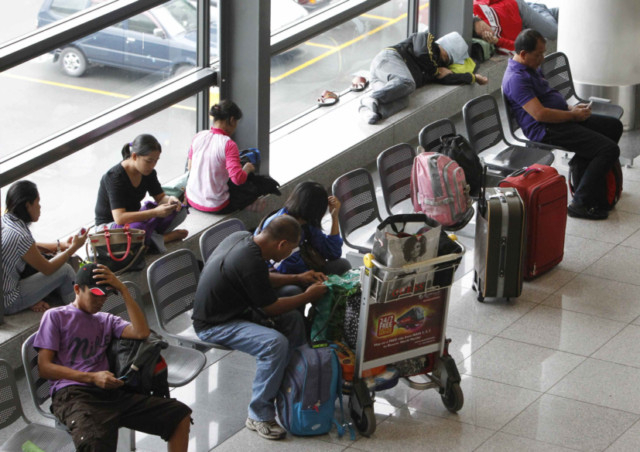Manila: The palace said it is pushing through with a plan to integrate a service charge on the tickets of international passengers despite stiff opposition from a sector that would be affected by the imposition — Filipino migrant worker groups.
Deputy presidential spokesperson Abigail Valte, in an interview over radio station dzRB, said: “Starting February 1, 2015, MIAA [Manila International Airport Authority] terminal fees would be integrated into airline tickets”.
Implementation of a memorandum circular No. 8 MIAA in mid-October directing the carriers to charge P550 (Dh44.82) on the tickets of arriving passengers as International Passenger Service Charge (IPSC), had been temporarily held off following a clamour from overseas Filipino workers (OFW) who had to advance the amount when they or their company paid for their plane fares.
For several years now, Filipino migrant workers had been exempted from paying service charges, commonly known as “terminal fee,” on the basis of a 19-year-od law, Republic Act 10022 or the Amended Migrant Workers and Overseas Filipinos Act of 1995.
The group #Noto550 Coalition was able to secure a restraining order from Pasay City trial court Judge Tingaraan Guiling, who said the airport authority cannot implement the integrated terminal fee because under the law, any new rules or new guidelines issued by the government must first be published in a Gazette or official publication before it can take effect.
However, according to Valte, the Manila Ninoy Aquino International Airport (NAIA) had already satisfied this rule by publishing new circulars and thus, the implementation of the IPSC can take effect by February 1, 2015.
Officials had said that OFW are still exempted from paying the IPSC, however they have to show certificates that they are indeed migrant workers.
Ferdie Maglalang, spokesman of the #Noto550 Coalition had said that the implementation of the IPSC places a burden on OFWs because, while it exempt OFWs from actually paying the terminal fee, they have to go through the tedious process of falling in line at the counters to secure their certifications and get reimbursement for the amount they have advanced for the terminal fee.
Earlier, in an effort to settle the issue on whether OFWs have to pay for terminal fees, Representative Roy Seneres of the OFW Family Partylist had submitted a resolution before the House Committee on Overseas Workers Affairs and the Committee on Transportation, calling for a joint inquiry into the legality and propriety of Memorandum Circular No. 8, sought to be implemented by MIAA, which imposes airport terminal fees on point of sale, against all international passengers, including OFWs. A similar measure had been submitted by Senator Koko Pimentel before the Senate.
Ironically, according to the MIAA, the aim of the integration scheme “is to address the congestion in all Ninoy Aquino International Airport (NAIA) terminals, caused by the increasing volume of passengers, through the adoption of measures to reduce the processing time of passengers, thereby promoting smoother, more convenient, and hassle-free travel experience[s].”













